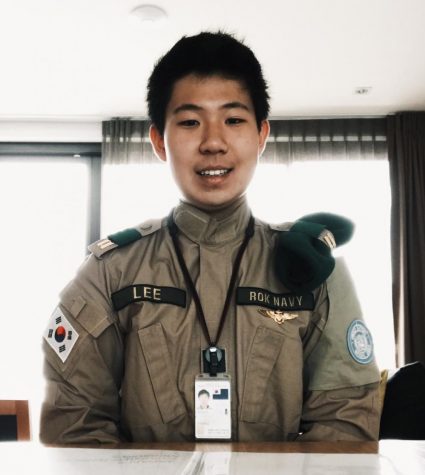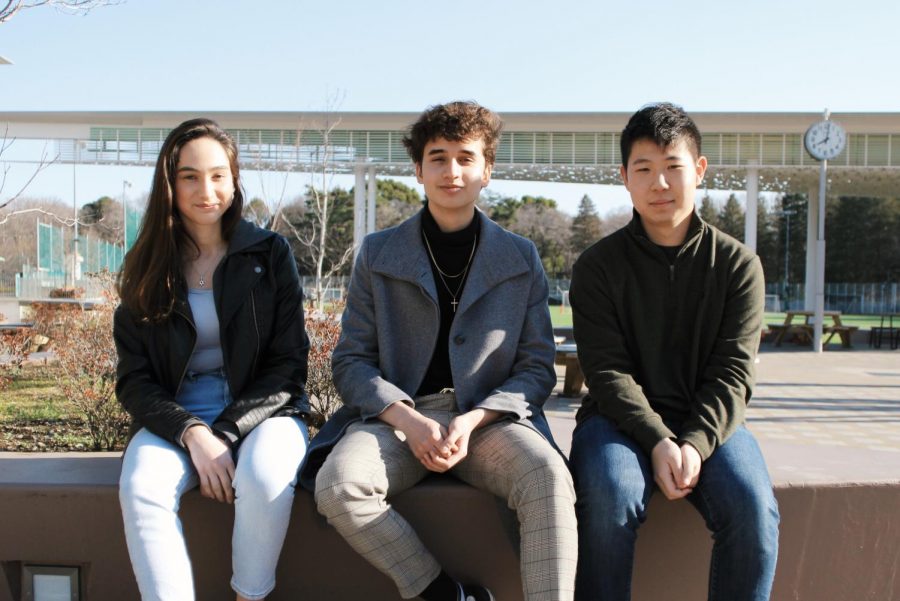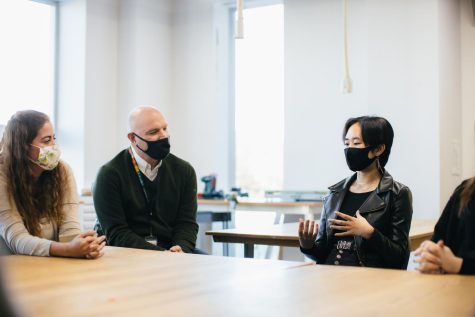Next for Some ASIJ Seniors? Mandatory Military Service
Photo by Dohyun Kim
Bar Savion, Ryan Elferink, Leo Lee (from left) are members of the senior class that will be heading to the military following their graduation from ASIJ.
As an ASIJ sophomore myself, I am well aware of the stress that all high schoolers feel about the uncertain future. However, while most students at ASIJ will be going to college immediately after senior year, there are a few who will be leading completely different lives fulfilling mandatory military service.
I interviewed three of our own seniors — Leo Lee (South Korea), Bar Savion (Israel), and Ryan Elferink (Singapore) — who will be participating in the military service that their countries require after they graduate this year.
Compulsory military service is not necessarily a rare thing, but it is becoming increasingly hard to find in more developed countries. Countries such as Ukraine, Kazakhstan, and Georgia are looking to abolish it in the near future.

While the word “military” may have violent connotations, it is not all about learning how to handle weapons and war tactics, as some may think. When asked what sector of the military he wanted to participate in, Lee responded that he’d already gone to a summer seminar where he was given a rough overview on what they would do while serving the country. This included learning about so-called “soft powers,” the use of attraction and cooperation instead of coercive methods to “achieve goals in the long run,” as Lee explained. One could say that the concepts Lee is learning are more diplomatic rather than militaristic.

Another common misconception is that only males are conscripted. Israel, where Savion is from, is one of eight countries that obliges women to participate in the military. Not only that, but she is looking to take on important positions, such as Navy sergeant, and pilot. There is a perception that females are not exactly welcome in the military, but this is not the case in Israel.
One issue for teens and 20 year-olds being in the military for two to three years is the delay in beginning college. Having said that, Savion might be able to attend college during her years of service, or will simply do so after. Being in the military does not necessarily have to affect the level of education soldiers will get.
Before conducting the interview, I was expecting responses to skew two ways to the question of whether military conscription should be mandatory. One being an extremely patriotic and resounding “yes!” and the other a “no, it’s taking away years of my life!” However, Elferink, Lee, and Savion all agreed that it is one way to bring a nation together, and they wouldn’t call it a burden. “It creates a sense that everyone’s in it together” Elferink added, “It’s a way to pay back.”

It’s interesting seeing high schoolers with such a broad awareness of their civic responsibilities. They all have an admirable ability to to look beyond themselves and serve their countries.

I'm Julie and this is my second year writing as a Hanabi staff member. I mostly write features...
Dohyun is a senior at ASIJ. She is from Seoul, South Korea, but has been living in Tokyo, Japan for most...












Billy • Jun 1, 2023 at 8:59 AM
I think this article really changed my mindset on mandatory military service. I see many articles about famous celebrities who ditch their military service, but this article shines the light on those who see the good part in military service
Miyu • Dec 13, 2019 at 9:02 AM
I am delighted that these 3 are optimistic about serving in the military for several years, but there certainly must be other teens that do not feel the same way. After all, it is a crucial time for most to consider their careers and to further develop their skills. I personally do not agree with mandatory military service, but I wish them luck.
Nozomi Greimel • Dec 12, 2019 at 12:17 PM
This article broadened my view of the world. I didn’t know much about these military requirements and I found it interesting how some ASIJ students will be taking part in it as well. As hard as it must be to be a part of the military, I can’t imagine how difficult it might be to balance college at the same time.
Jay Dossor • Dec 12, 2019 at 8:27 AM
This article was very interesting. I feel very bad for the 3 because they had a big chunk of their life taken away from them, but from their perspective, I guess they don’t that. It was interesting to read all of them agree Mandatory Military Service brings the nation together.
John McCready • Dec 12, 2019 at 8:27 AM
This article gave me lots of new information to change my perspective on MMS. Previously, I thought that most of the people who were forced to serve would see it as a negative thing, as they got some of their most fun years taken away by their country. It was also very good to know that they not only don’t think of MMS as a negative thing, but they see it as a very good way to unite as a nation.
Sam Curwen • Dec 12, 2019 at 8:20 AM
I agree with Lukas Fackler about more countries (re)-adopting required military service, but I do not believe it should be right out of high school or if you do have to join right out of high school it should be for 5 years and you get assistance from the government about furthering their career in either the military or going into college.
Ella • Dec 12, 2019 at 8:19 AM
This was really interesting to read and get an idea for what some of my friends are talking about when they mention mandatory military service.
Lukas Fackler • Nov 20, 2019 at 6:54 PM
Conscription is necessary for the protection of a nation. More countries, such as Japan and the United States, should (re-)adopt it, as it will make for a more uniform and united society. There is no greater honor than to serve your nation in the face of foreign threats, especially in this day and age with the aggressive incursions of China and North Korea.
Mrs. Bennett • Apr 19, 2019 at 7:18 PM
Thank you for sharing. It is important for us to understand that there are different options after high school. College is not the only choice! As someone who served in the Canadian military for three years while attending university, I learned that serving your country is very important. The most important thing I learned in the military was how to effectively collaborate.
Kathy O'Shea • Mar 23, 2019 at 1:00 PM
It’s so cool that rather than being negative about having to go to the army, all three of you are positive about it and are going to make the most of it.
Alona Saffen • Mar 22, 2019 at 2:59 PM
I love that all three of them, Bar Savion, Ryan Elferink, Leo Lee, are very positive about participating in their countries military after they graduate. I found it cool that Israel makes women participate in the military too, and not just men.
Miriya Greer • Mar 22, 2019 at 2:59 PM
College AND working in the military? That sounds hard enough! At the same time, some militaries do offer college education while they are in service (if that makes any sense). I know the US does. Does the Israeli military also have that sort of program, or is it just something the people serving can chose that won’t (or might not) affect their duties?
Still, I find that aspect cool.
Jake Robinson • Mar 22, 2019 at 2:57 PM
I didn’t know that there were so many countries that still have mandatory military service. I knew that there were a few such as Thailand and South Korea, but I thought most of it in other countries was over. 10/10 would read again.
Hugo Hasegawa • Mar 22, 2019 at 2:56 PM
I haven’t thought much about countries that require graduate students to go to the military before reading about this article. When I heard the words, “Mandatory Military Service”, it sounded as if people are forced to join against their own will. However, by reading this article, the idea of “Mandatory Military Service” in me has changed. I saw optimistic views about it and felt that there are many different perspectives about this issue and that there many good outcomes from this service.
Seeun Kwon • Mar 22, 2019 at 2:53 PM
Wow, I never knew that there were students at ASIJ who are required to join the military service right after they graduate from high school. This whole idea of joining the “military” seems very official and harsh for me. I can’t imagine how it would be like—once they finish High school, they have to join the military. This sounds really difficult and challenging. One thing from this article that really surprised or got to me was about Bar, and how she is also required to join the military service from next year. I am South Korean, and in Korea, only men are required for the military, not the girls. So I am not really familiar to the idea of girls joining the military. I wish the best of luck to all 3!
Dylan Thomson • Mar 22, 2019 at 10:46 AM
Good article. It’s interesting to learn about the futures of these ASIJ students going into the military.
Asako I. • Mar 22, 2019 at 10:45 AM
I thought that it was interesting how they all thought that military service was a way to ‘bring a nation together’. This article was really fun to read and kept me hooked all the way!
Eva Loftus • Mar 22, 2019 at 10:44 AM
Thank you for the really informative article! It was really interesting to learn the different ways people can serve or give back to their countries.
Mason Maier • Mar 22, 2019 at 10:41 AM
I want to feel bad for you guys for having such a big life choice made for you, but its really cool that you guys take the challenge on and embrace it, instead of letting it put you down or control you.
Ryan • Mar 22, 2019 at 9:02 AM
This is cool and very interesting and gave lots of good insight.
Vishal Subramanian • Mar 22, 2019 at 9:00 AM
Just out of curiosity, how did you guys get pictures of two people in the military? After all, isn’t it against military policy, of most countries to take pictures of training or other things?